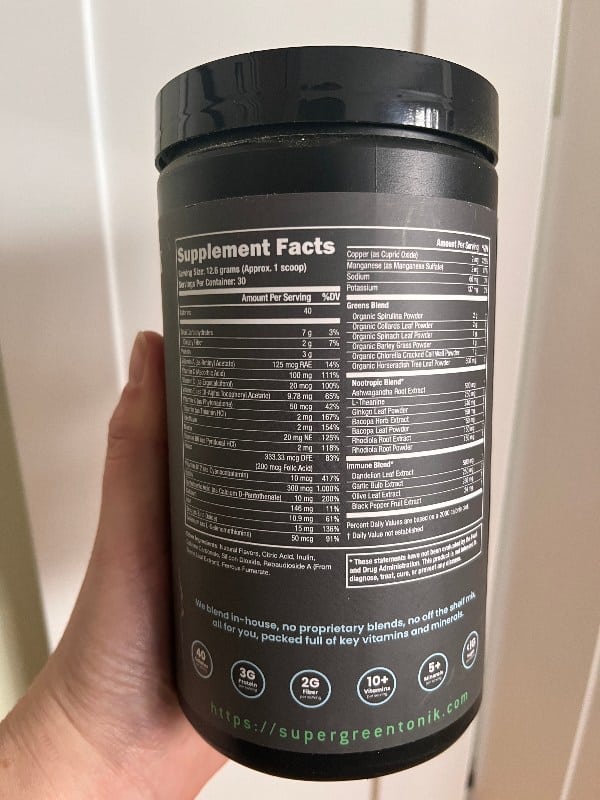Disclosure: This page may contain affiliate links, meaning we receive a commission if you decide to make a purchase through our links, but this is at no additional cost to you. Please read our disclosure and privacy statement for more info.
Is working in a warehouse too hot and too physically demanding or is it the ideal job for minimal mental stress? Over the past few decades, the workforce has seen a considerable increase in warehouse jobs becoming available. In fact, warehouse workers are currently in extremely high demand potentially due to our 24-hour economy where consumers want the items yesterday. So you are most likely here because you are considering this line of work – so let’s see if a warehouse job is really for you.
Working in a warehouse is specific to the individual. The work can be taxing on one’s body and the hours are typically long. However, some prefer a job where they are constantly active, may work alone and have more flexibility with their schedule. Confirm the exact details of the role before deciding if it’s right for you.
There are a lot of preconceived notions about working in a warehouse that deters people from applying. However, the pay is now at a place where it is typically equal to the amount of work you’re doing. So, people are inclined to accept these jobs now more than ever. If this sounds like something you’re interested in, read along with us and discover exactly what it’s like to work within a warehouse. Here your questions are answered.
Is it Difficult to Work in a Warehouse?
Working in a warehouse is no easy feat. The hours are traditionally long and the labor can be horrid depending on your job title. One thing common when working a warehouse job is that you’ll likely be on your feet the entirety of your shift, doing repetitive movements – pushing, pulling, lifting, and climbing. Yes, these types of jobs aren’t for everyone.
Those roles that are physically demanding are best for those who are able to withstand the hard work and long hours. A large number of warehouse jobs operate 24/7, 365 days out of the year – meaning, you’re likely to be put on ten or twelve-hour shifts. If you’re looking for a typical 9 to 5, Monday through Friday, a warehouse job might not be for you. Keep reading – Shift Work vs 9-5: What Working Schedule Best Suits You?
Some of the environmental conditions can also make working in a warehouse extremely difficult. Depending on what the warehouse is storing, the conditions can be very hot to very cold, or there could be a lack of ventilation altogether.
Most warehouses are enclosed and secluded. Again, before you accept a job working in a warehouse, it’d be wise to inquire about the environmental conditions you’ll be enduring each shift.
The actual position may require you to operate heavy machinery. This machinery isn’t always the easiest to work with and can require a learning curve, which can be stressful for someone coming in with no experience. This could make your experience a little more difficult than if you were to go into the position with some knowledge on the tools and machines you’ll be using.
However, the great part of being hired at an entry-level warehouse job is that most offer in-house training. So, it will only be difficult for a time and will eventually become second nature to you.
Summary: What Makes Warehouse Work Challenging?
– Conditions (Often hot, dusty and can have poor ventilation)
– Long, shift working hours
– Significant time standing
– Potentially dangerous work (I.e using heavy equipment without prior knowledge)
– Physically demanding
– Increased chance of injury
But there are lots of benefits too! Let’s look into those.
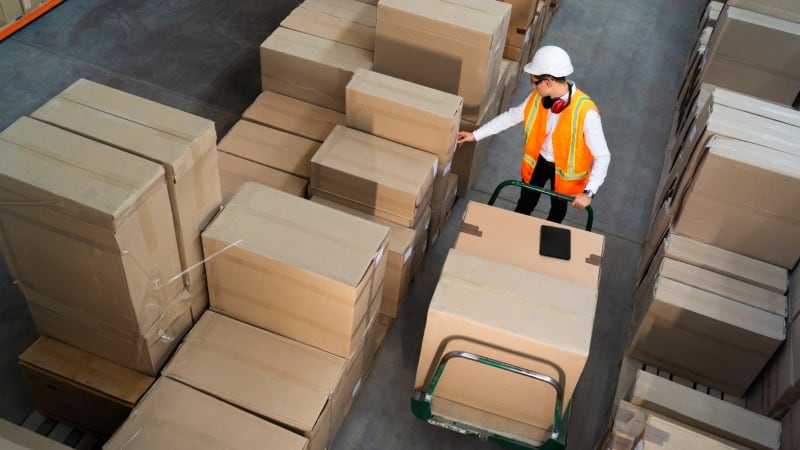
What are the Benefits of Working in a Wearhouse?
Limited mental stress
Due to the repetitive nature of the work, you’ll find that once you understand your role it will become second nature. Though there is certainly physical stress to consider, some suggest you can almost function on auto-pilot from a mental workload perspective.
On the flip side, some may say it’s actually mentally draining because you are not being stimulated and the job is repetitive. It all depends on your perspective I guess.
Little to no experience required
Most entry-level warehouse-type roles will employ workers without any prior experience. Some will even provide on-the-job training should you be placed into a position that requires certain expertise.
Flexible hours
Because most warehouses operate 24/7, chances are you’ll get to select working hours best suited for your lifestyle. Most places have a day shift, mid-shift, and a night shift.
If working a rotating or shift work roster is new to you, The Other Shift can help! Feel free to get in touch via email at [email protected].
Independent work
When you’re looking at the overall picture, the warehouse usually works as a team. However, the work you do to get to that final state is usually done independently. Meaning, the job you are hired for, you’re typically the only one doing that job during your shift. If you like solitude, this could be the best fit for you!
Furthermore, if you’re an introvert, or simply don’t want to work with the public, a role can have very little if any exposure to customers.
Reasonable pay
As reported by Indeed, the average warehouse worker makes $18.60 hourly. This could mean great money in your pocket, especially if you’re pulling overtime hours.
You’ll always meet your daily step count
As we’ve already discussed – working in a warehouse is a workout all in itself. Chances are, if you’re not already in shape when you start, you’ll be in shape in no time. It’s a great way to keep your weight down and your body toned! This is great because it’ll save you from having to make a trip to the gym. We see it as a two-for-one deal.
Related post: Manual Labor vs The Gym. What Approach Wins in the Real World?
Advancement
If you notice, when applying for a warehouse job, most of them are entry-level positions only. You’ll rarely see a job for a supervisor or position higher up. That’s because the majority of these businesses are looking to promote from within. They want people that they’ve trained from the ground up to take over more senior positions. So, working in a warehouse is a great way to advance your career into something bigger.
What’s the difference between working on the assembly/production line and working in a warehouse?
An assembly/production line type job is where you review a product while it’s being made before it is packaged and sent. This job is often repetitive in nature and requires standing in one spot for the majority of your shift. A warehouse job on the other hand requires the movement of boxes and pallets full of finished products so they can be shipped, but may also involve heavy machinery to produce the actual product. Warehouse work is often physically demanding requiring more movement.

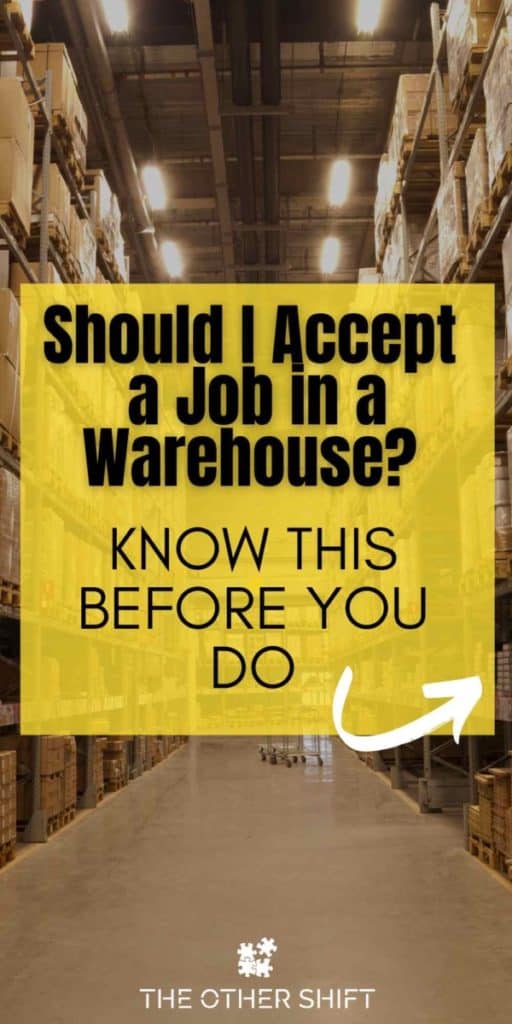
Is Working in a Warehouse a Good Workout?
One thing that you can bet on is that working in a warehouse is considered a daily workout for some. As we said previously, you’re likely to be on your feet the entirety of your shift, potentially up to twelve hours a day.
Depending on the job you’re assigned, chances are you’ll be doing repetitive motions for the duration of the shift – working the same muscles over and over again. You’ll likely have timed tasks, making you move faster than you may normally move. You’ll wind up building muscle and placing yourself in a position to loose weight working in a warehouse.
Because you’re basically working out all day, you’ll want to take care of your body after you get off. Some people experience all the aches and pains your body can muster, so when you get off do little things that can alleviate some of that pain and stress on your body.
For example, there are going to be times where your feet are throbbing by the end of your shift. When you get home, lay flat on your back with your legs elevated against the wall. This allows for the blood to drain from your feet for a few minutes, releasing pressure and in turn alleviating pain and swelling. Check out this post about foot and leg pain for more information!

How Do You Survive a Warehouse Job?
A warehouse can be a great place to work. Like any other job, it has its highs and its lows, but it’s what you make of it that counts
We wanted to give you some tips on not only surviving working a warehouse job, but thriving while working there. Don’t take these tips lightly – they could make a world of difference in your career.
Appropriate clothing
Be comfortable while still following the dress code and safety precautions. The type of clothing that you wear can make or break your shift. It has a huge impact on your performance output for that day. Before starting, ask your employer about the working conditions. Is it hot? Cold? Whatever the inside weather is going to be, dress for that occasion.
Items to consider are;
- Comfortable, practical, footwear, consider steel-capped boots like this popular pair on Amazon from The Best Ever Boot Store

- Multi-tool such as the Gerber
- Gloves
- Hard hat and safety goggles (should be supplied by your employer)
- Knee pads (if required to kneel during the shift)
- Thick socks for comfort, to stop boots from rubbing
- Skin protective creams and balms (e.g lips, hands, face)
- Collared shirt (A polo shirt may be provided by your employer, though shirts with buttons may be an issue in some warehouses particularly those with heavy machinery)
- Work pants or jeans are generally acceptable. This pair is great for men and for women. (If you’re keen on shorts, chat with your manager about the potential safety risks).
- Back brace (if necessary) such as this popular one listed on Amazon


Safety Protocol
Be sure that you are strictly following the safety protocol laid out by your employer. These protocols are there for a reason – to make sure you stay safe! Working in a warehouse can be dangerous because of how physical it can be. Following safety protocol assists with eliminating some of the risks of injury.
If you are injured on the job, you don’t want it to be because you were not following instructions. Be sure you are using all the appropriate tools and techniques provided to you by your employer.
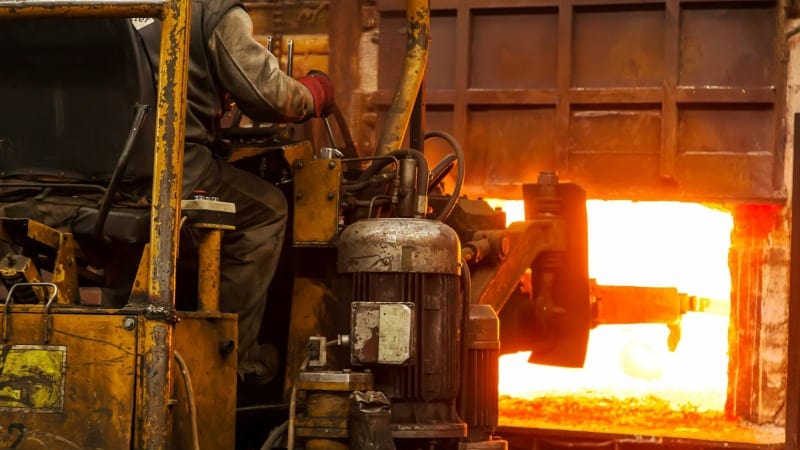
Eat Healthy / Stay Hydrated
When you’re busy and distracted, it’s easy to forget to drink water. It’s even easier to slot some cash into the vending machine for lunch. This job is tough and requires good fuel to keep you going. Eating healthy will assist with any sluggish feelings you may have and will reduce the risk of injury.
For an extra energy boost, give Human TONIK a go. We drink their green and red juice daily to minimize brain fog, boost productivity and sleep better. Check out their site here and use “OTHERSHIFT10” for 10% off.
As far as water is concerned, chances are you’ll be losing a lot of it by sweating. So, you need to constantly replenish by staying hydrated throughout your shift. Invest in a water bottle and keep it near you while you work. (We use the BEAST tumbler and love it)
Rest
Use your rest days to do just that. I know it’s not always feasible particaully if you have a family, but you need to give your body the time to heal itself after each shift. Be kind to yourself and try not to overdo it.
On your off days, do things that relax your body and your mind. Take care of yourself. Too much strain on your body can cause bigger issues down the line – issues that can be avoided with simply resting.
For some ideas on no-fuss self-care ideas, visit this post for more informationnad here for our recommendated sleep aids.
Massage
Either go to a spa or have your partner do it, but get frequent massages. A massage is one of the best ways to loosen up tight muscles and relieve joint pains.
We’ve just purchased one of these, hand-held massage guns and we couldn’t recommend it higher!


Stretch
When you’re constantly doing the same motion over and over again, you run the risk of being injured. It’s known as the Repetitive Strain Injury. Stretching your body in different directions frequently is one of the best ways to combat the chances of you being injured in this way.
Soak
I can’t stress this enough. Soak in a hot bath at the end of as many shifts as you possibly can. This will help with aches in your joints and will give you a sense of relaxation. Invest in something like Epsom salt to take your bath to the next level.
Early Riser
Get to work early. Why this matters for factory work, in particular, comes from an injury risk eversion perspective. When rushing we cut corners to keep up and in this industry, we can’t afford to skip safety procedures like securing and checking equipment. Save the stress and arrive 15 minutes early to get this done.
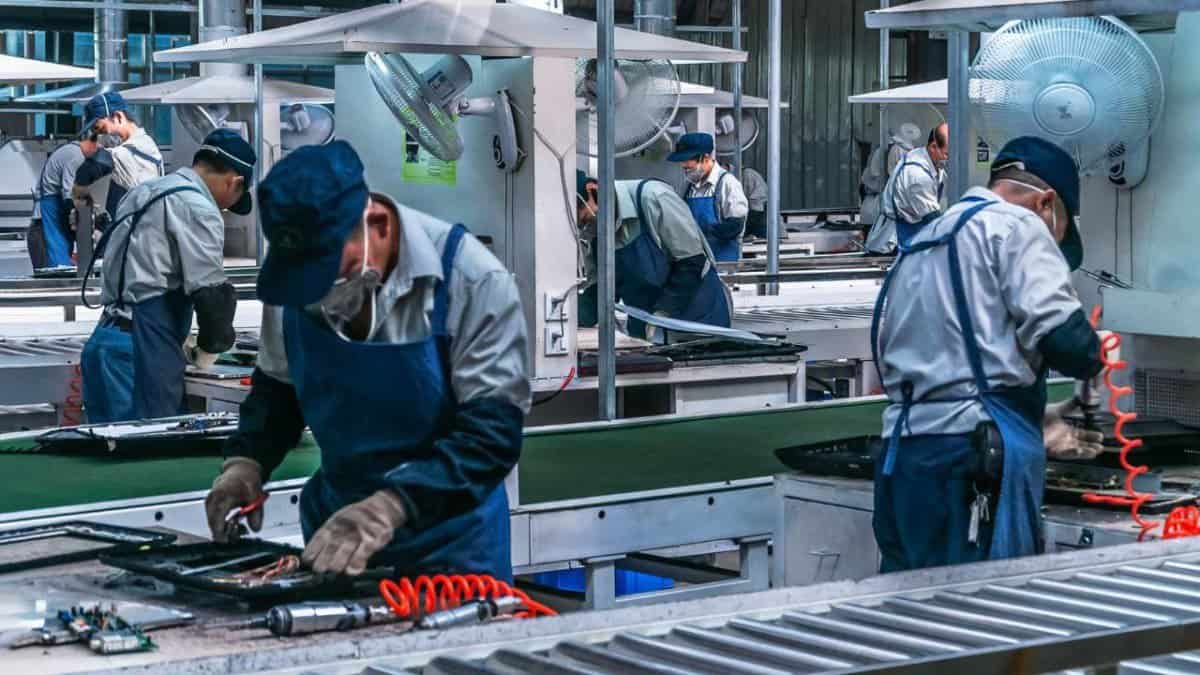
Do You Want More out of Working in a Warehouse?
Some who go to work and complete the same thing consistently want more. If you feel like you’re in this boat, consider what it takes to be successful. If you don’t know, then ask your line manager or someone in a position higher than you. As a great start, we recommend focusing on doing your basic job consistently while being a sponge and absorbing all of the added information given to you by managers.
Pro tip: Questions to consider before you start work;
– What will my day-to-day job look like?
– What hours and days will I be working?
– Do you offer on the job training?
– What is your pay structure when working outside of traditional hours and how should I keep track of my hours worked?
– Am I required to wear a uniform or particular safety equipment? Will this be supplied?
– Is there anything I can do to best prepare for this role?
-What are the differences in staff benefits to working for a small company vs large corporation such as Amazon?
– How will success in my role be measured? (…Considering a future promotion?)

Is Working in a Warehouse a Good Career Move?
Like any other job, there are pros and cons of working in a warehouse. Whether or not it is a “good” career choice is subjective. For some it may be perfect, for others it could be their last resort. However, we wanted to get into some specific details that could either set you on your path to a warehouse career or deter you away completely.
At the end of the day, the only person who can tell you whether or not you are a good fit as a warehouse worker is you. You know you better than anyone else. You know what your body is capable of and what it is not capable of.
There are ups and downs of working in a warehouse. If you are going to take a job like this, you need to be sure you know all the factors that go into it. Be sure that you refer back to this article if you need to.
Most importantly, get all of the information directly from the source – the company you’re applying to work for. In your interview, ask plenty of questions so that once you do get the job, you know exactly what you’re up for!

Disclosure: This page may contain affiliate links, meaning we receive a commission if you decide to make a purchase through our links, but this is at no additional cost to you. Please read our disclosure and privacy statement for more info.

Recent Posts
While the stresses and hardships of work affect all, signs point to significant pressures faced by those working through the night leading to early critical health problems. But is it all doom...
Switching your days and nights around might be easy in your twenties, simply pull an all-nighter and crash. Problem solved. If you’ve been on midnights for ten or more years though, the adjustment...


